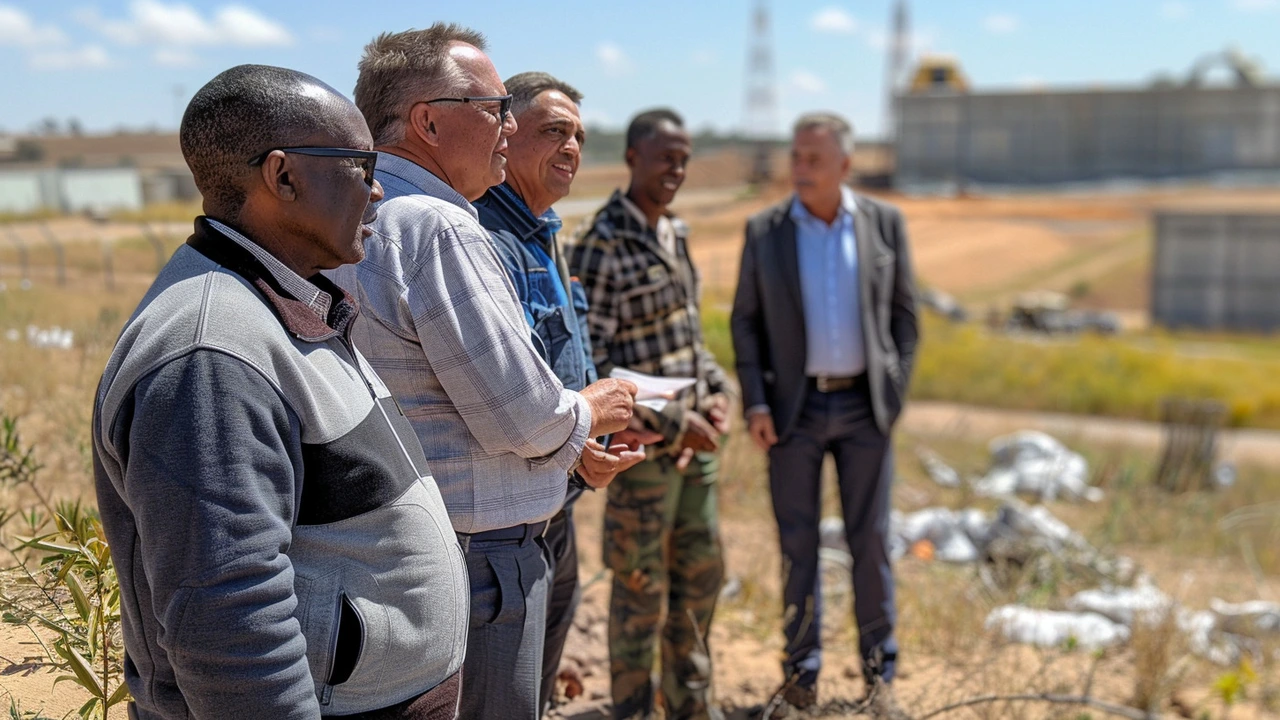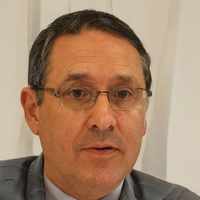In a significant development that underscores the power of international cooperation in fostering community growth, staff members from the Australian Embassy in Zimbabwe embarked on a visit to the Greenfields project located in Emganwini. This project represents a beacon of hope and resilience, operated by the Sally Foundation in conjunction with the Zimbabwe Development Democracy Trust (ZDDT). The aim of their visit was to engage with local leaders and stakeholders to discuss the profound impact of the market garden development, which has been meticulously supported by the foundation.
The meeting was graced by the presence of Andrew Marriott from DFAT Canberra and Alyce Kelsall from the embassy in Harare, alongside key representatives from ZDDT, including National Development Officer, Simon Spooner, and Field Correspondent, Mandla Tshuma. Also in attendance was Mr. Chris Nkosi, the newly appointed Chairman of the community's committee, who enthusiastically welcomed the distinguished guests.
The dialogue between the Australian team and local leaders was not just a mere exchange of pleasantries but a profound exploration of how the market garden development is catalyzing opportunities for the community at large. This collaboration is a testament to the spirit of partnership and shared visions for fostering socio-economic development. The initiative has been particularly vital in an environment that mirrors the broader challenges faced by Zimbabwe as a nation, yet, through such projects, communities like Emganwini are witnessing tangible progress.
Peter Nyoni, the former chairman of the group, expressed heartfelt gratitude for the unwavering support provided by the Australian funders. He illuminated how the garden had transformed into a cornerstone of livelihood for the community members. The significance of the project extends beyond its immediate economic benefits, as it has enabled residents to access fresh produce within their vicinity. This local availability of food items significantly curtails the need for community members to undertake arduous journeys to purchase essential food products.
The commitment of the Australian Embassy, alongside the relentless efforts of the Sally Foundation and ZDDT, illuminates a path of sustainable development and community empowerment. By focusing on initiatives such as the Greenfields project, this partnership is ensuring that communities are not left behind in the pursuit of national prosperity. The project stands as a living example of how strategic collaborations can spearhead the transformation of communities through sustainable agricultural practices.
Moreover, this venture into community development is a clear indication of the potential impact of international cooperation in addressing local challenges. By fostering a culture of inclusivity and support, projects like these are instrumental in building a foundation for long-term socio-economic stability. The efforts of the Australian Embassy in Zimbabwe, in concert with local partners, signify a powerful commitment to uplifting communities and championing the cause of development and democracy in the region.



19 Comments
Dade Hughston
March 24, 2024 AT 07:29This is the kind of feel-good nonsense that gets published when there’s nothing real happening in the world
Greenfields project? Sounds like a corporate rebrand for a charity that’s barely keeping people alive with donated seeds and a rusty hoe
Oliver Myers
March 24, 2024 AT 15:12Actually, I’ve seen projects like this in rural Kenya and they change lives. Fresh veggies mean kids aren’t malnourished, women aren’t walking 10km to buy potatoes, and families start saving money instead of spending it on imported cabbage. This isn’t just charity-it’s dignity.
Keep doing the work, Emganwini. You’re winning.
Alex Sherman
March 25, 2024 AT 09:42Of course the Aussies are out here playing Mother Superior while their own farmers get gutted by climate policy and their cities drown in rent hikes
Real compassion starts at home, not in some African village where they hand out kale and take selfies
Caitlin Stewart
March 27, 2024 AT 02:19I lived in Harare for two years and saw how these small-scale agri-initiatives quietly rebuild communities. It’s not glamorous, but it’s real.
People grow tomatoes, sell them at the roadside, send their kids to school. That’s the quiet revolution.
And honestly? The Australians aren’t here to pat themselves on the back-they’re here because someone asked them to show up.
Ajay Kumar
March 28, 2024 AT 11:54Let’s be real-this is just another Western project wrapped in ‘sustainability’ jargon to justify foreign aid budgets
Who even decided that market gardens are the solution? Did anyone ask the community what they wanted? Or did they just assume ‘fresh produce’ is the universal dream?
What about solar-powered water pumps? Or mobile banking? Or actual infrastructure? No, let’s give them spinach and call it development
Joseph Kiser
March 28, 2024 AT 16:19This is beautiful 😊
Real change doesn’t come from big speeches or billion-dollar loans-it comes from someone showing up with seeds, tools, and respect.
Thank you to everyone on the ground in Emganwini-you’re the real heroes.
And to the Aussies: you didn’t just fund a garden. You planted hope. 🌱❤️
Jens Petersen
March 30, 2024 AT 12:26How utterly predictable. The Australian Embassy, draped in the flag of ‘development,’ swoops in like some benevolent colonial apparition, armed with PowerPoint slides and a press release about ‘resilience’
Meanwhile, the Sally Foundation-funded by a trust that’s 87% owned by a Sydney hedge fund-rebrands food aid as ‘community empowerment’
And the locals? They’re just props in a performative NGO spectacle. The market garden isn’t sustainable-it’s symbolic.
Real sovereignty isn’t grown in raised beds. It’s written in constitutions, enforced by institutions, and funded by local taxation-not foreign grants.
They’re not lifting communities. They’re curating them for Instagram.
Next they’ll install solar-powered Wi-Fi and call it ‘digital inclusion.’
Meanwhile, Zimbabwe’s real infrastructure crumbles because the IMF got their cut.
And the people? They’re just smiling for the camera while their children eat cabbage because the price of maize went up again.
This isn’t development. It’s aesthetics with a humanitarian veneer.
And you all lap it up like it’s the last free meal before the austerity cuts hit.
Wake up. This isn’t charity. It’s soft imperialism with a compost bin.
Emmalee Amthor
April 1, 2024 AT 04:52you people are so obsessed with the politics of aid you forget the actual people
some kid in emganwini is eating his first homegrown tomato because of this
that’s more real than any lecture on neocolonialism
you’re not helping by being mad
you’re just being loud
Hazel Wolstenholme
April 2, 2024 AT 08:27Oh please. The Australian Embassy is just another branch of the ‘Global Development Industrial Complex’
They need to justify their foreign aid budget, so they fund a garden that looks good in brochures
Meanwhile, the real crisis-hyperinflation, collapsing utilities, land reform failures-is ignored because it doesn’t fit the ‘heartwarming story’ narrative
And the ZDDT? Probably just a local front for the same elite that’s been running Zimbabwe into the ground for decades
Don’t mistake visibility for impact.
And don’t mistake charity for justice.
John Concepcion
April 2, 2024 AT 21:45so the aussies flew all the way to zimbabwe to... water plants?
bruh. i’ve seen better gardening on my aunt’s balcony in florida
next they’ll be teaching them how to pronounce ‘avocado’
and then we get a documentary on netflix called ‘The Garden That Saved Africa’
with a soundtrack by coldplay
Saumyata Tiwari
April 4, 2024 AT 16:56How quaint. An Australian embassy in Zimbabwe? Who authorized this? Did they consult the Zimbabwean people? Or are we just supposed to be grateful for foreign handouts while our own leaders are sidelined?
And why is the Sally Foundation even involved? Is it even registered in Zimbabwe? Or is this just another NGO with a fancy name and a tax loophole?
Don’t get me wrong-I’m not against development.
But this feels like a PR stunt dressed in organic mulch.
Anthony Tong
April 6, 2024 AT 04:26And you wonder why the West can’t be trusted
First they destabilized our economies, then they send diplomats with seed packets to make us feel better
They don’t want us to be independent-they want us to be dependent on their aid programs
This isn’t development. It’s psychological colonization
And the fact that people here are clapping like it’s a miracle proves how broken the system is
Wake up. This is how empires control the third world-with kale and kindness
Roy Scorer
April 7, 2024 AT 22:05It’s tragic, really. The same people who scream about exploitation in the Global South are the first to celebrate a garden as ‘empowerment’
But empowerment isn’t a tomato.
Empowerment is control over your currency, your laws, your land
And yet here we are, celebrating a plot of dirt as if it’s the end of colonialism
It’s not hope. It’s distraction.
And the emotional manipulation? The gratitude? The ‘thank you’ quotes? That’s the real weapon.
They don’t need your resources-they need your silence.
Mike Laska
April 8, 2024 AT 01:54My cousin works for DFAT and she told me they get a bonus if they hit ‘community impact’ targets
So they send people to plant kale and call it a win
Meanwhile, the real work-building roads, fixing clinics, training teachers-isn’t photogenic
So it gets ignored
And the locals? They get a photo op and a pamphlet on ‘sustainable nutrition’
Meanwhile, the water pump broke six months ago and no one’s coming back to fix it
This isn’t compassion.
This is performance.
Katie Ring
April 9, 2024 AT 04:31There’s something deeply human about growing your own food-it’s primal, it’s healing, it’s resistance
When you plant a seed and it grows, you’re not just feeding your body-you’re reclaiming agency
And yes, maybe the funding came from abroad
But the hands that dug the soil? The sweat that watered it? The laughter over stolen corn? That’s all theirs
Don’t reduce dignity to a donor report
This isn’t about who paid for the seeds
It’s about who got to choose to grow
Dade Hughston
April 9, 2024 AT 22:02So what? The tomatoes are organic and the photos are pretty
But when the funding runs out in 18 months, what happens?
They’ll be back to walking 15km for a bag of maize
And you’ll be here, posting about ‘resilience’ while the garden turns to dust
Real change doesn’t come from a 2-year grant
It comes from systemic reform
And nobody’s talking about that
Joseph Kiser
April 10, 2024 AT 12:00you’re right about the funding cycle being short-term 😔
but that doesn’t erase what’s happening now
right now, a mother is feeding her child something she grew herself
right now, a boy is learning how to care for plants instead of begging on the street
that matters
and if we wait for perfect systems before we do anything good
we’ll wait forever
so yes-let’s demand better systems
but let’s also celebrate what’s working today
because sometimes hope isn’t a policy
it’s a tomato
Adarsha Foundation
April 11, 2024 AT 06:06I come from a village in India where a similar project changed everything
Not because of foreign money
But because the community owned it
They chose the crops, trained each other, sold the surplus
The Australians didn’t lead-they listened
And that’s the difference
It’s not about who funded it
It’s about who led it
And from what I’ve seen, Emganwini is leading
Leslie Schnack
April 12, 2024 AT 17:10Has anyone checked if the market garden is actually profitable? Or is it just a subsistence plot?
Because if it’s not generating income beyond feeding families, then it’s not a sustainable economic model-it’s a social safety net
And safety nets are good, but they’re not development
Development means creating systems that outlive the donor